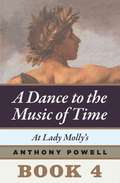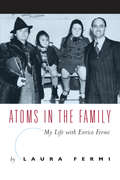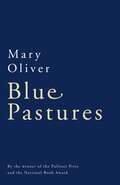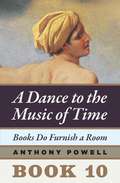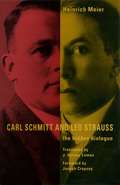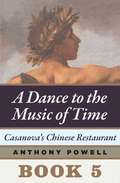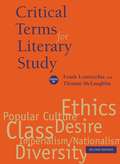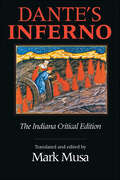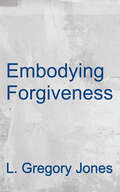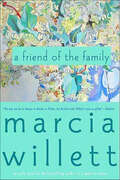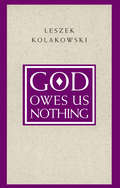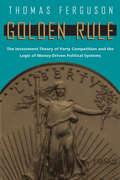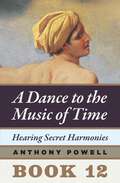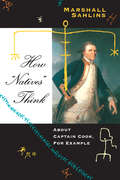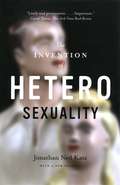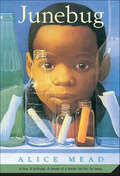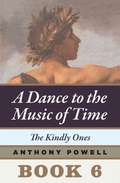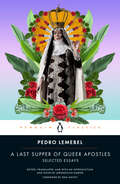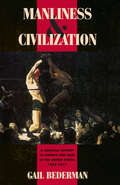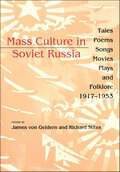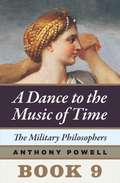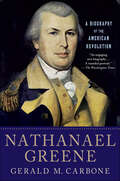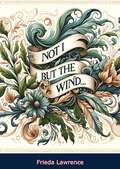- Table View
- List View
At Lady Molly's: Book 4 Of A Dance To The Music Of Time (A Dance of Music and Time)
by Anthony PowellAnthony Powell’s universally acclaimed epic A Dance to the Music of Time offers a matchless panorama of twentieth-century London. Now, for the first time in decades, readers in the United States can read the books of Dance as they were originally published—as twelve individual novels—but with a twenty-first-century twist: they’re available only as e-books. As the fourth book, At Lady Molly’s (1957), opens, the heady pleasures of the 1920s have begun to give way to the austerity and worries of the 1930s. Even so, the whirl of London life continues: friends commit to causes and to spouses, confess adulteries, and fall victim to dissipation and disillusion. As Nick moves ever more comfortably in the worlds of art, culture, and society, Powell’s palette broadens: old friends make appearances, but new ones take places on the stage as well—including Isobel Tolland, whom Nick knows at first sight he’s destined to marry. "Anthony Powell is the best living English novelist by far. His admirers are addicts, let us face it, held in thrall by a magician."--ChicagoTribune "A book which creates a world and explores it in depth, which ponders changing relationships and values, which creates brilliantly living and diverse characters and then watches them grow and change in their milieu. . . . Powell's world is as large and as complex as Proust's."--Elizabeth Janeway, New YorkTimes "One of the most important works of fiction since the Second World War. . . . The novel looked, as it began, something like a comedy of manners; then, for a while, like a tragedy of manners; now like a vastly entertaining, deeply melancholy, yet somehow courageous statement about human experience."--Naomi Bliven, New Yorker“The most brilliant and penetrating novelist we have.”--Kingsley Amis
Atoms in the Family: My Life with Enrico Fermi
by Laura FermiIn this absorbing account of life with the great atomic scientist Enrico Fermi, Laura Fermi tells the story of their emigration to the United States in the 1930s—part of the widespread movement of scientists from Europe to the New World that was so important to the development of the first atomic bomb. Combining intellectual biography and social history, Laura Fermi traces her husband's career from his childhood, when he taught himself physics, through his rise in the Italian university system concurrent with the rise of fascism, to his receipt of the Nobel Prize, which offered a perfect opportunity to flee the country without arousing official suspicion, and his odyssey to the United States.
Blue Pastures
by Mary OliverWith consummate craftsmanship, Mary Oliver has fashioned fifteen luminous prose pieces: on nature, writing, and herself and those around her. She praises Whitman, denounces cuteness, notes where to find the extraordinary, and extols solitude.
Books Do Furnish a Room: Book 10 Of A Dance To The Music Of Time (A Dance of Music and Time)
by Anthony PowellAnthony Powell’s universally acclaimed epic A Dance to the Music of Time offers a matchless panorama of twentieth-century London. Now, for the first time in decades, readers in the United States can read the books of Dance as they were originally published—as twelve individual novels—but with a twenty-first-century twist: they’re available only as e-books. The tenth volume, Books Do Furnish a Room (1971), finds Nick Jenkins and his circle beginning to re-establish their lives and careers in the wake of the war. Nick dives into work on a study of Robert Burton; Widmerpool grapples with the increasingly difficult and cruel Pamela Flitton—now his wife; and we are introduced to the series’ next great character, the dissolute Bohemian novelist X. Trapnel, a man who exudes in equal measure mystery, talent, and an air of self-destruction. "Anthony Powell is the best living English novelist by far. His admirers are addicts, let us face it, held in thrall by a magician."--ChicagoTribune "A book which creates a world and explores it in depth, which ponders changing relationships and values, which creates brilliantly living and diverse characters and then watches them grow and change in their milieu. . . . Powell's world is as large and as complex as Proust's."--Elizabeth Janeway, New YorkTimes "One of the most important works of fiction since the Second World War. . . . The novel looked, as it began, something like a comedy of manners; then, for a while, like a tragedy of manners; now like a vastly entertaining, deeply melancholy, yet somehow courageous statement about human experience."--Naomi Bliven, New Yorker “The most brilliant and penetrating novelist we have.”--Kingsley Amis
Carl Schmitt and Leo Strauss: The Hidden Dialogue
by Heinrich MeierCarl Schmitt was the most famous and controversial defender of political theology in the twentieth century. But in his best-known work, The Concept of the Political, issued in 1927, 1932, and 1933, political considerations led him to conceal the dependence of his political theory on his faith in divine revelation. In 1932 Leo Strauss published a critical review of Concept that initiated an extremely subtle exchange between Schmitt and Strauss regarding Schmitt’s critique of liberalism. Although Schmitt never answered Strauss publicly, in the third edition of his book he changed a number of passages in response to Strauss’s criticisms. Now, in this elegant translation by J. Harvey Lomax, Heinrich Meier shows us what the remarkable dialogue between Schmitt and Strauss reveals about the development of these two seminal thinkers. Meier contends that their exchange only ostensibly revolves around liberalism. At its heart, their “hidden dialogue” explores the fundamental conflict between political theology and political philosophy, between revelation and reasonand ultimately, the vital question of how human beings ought to live their lives. “Heinrich Meier’s treatment of Schmitt’s writings is morally analytical without moralizing, a remarkable feat in view of Schmitt’s past. He wishes to understand what Schmitt was after rather than to dismiss him out of hand or bowdlerize his thoughts for contemporary political purposes.”—Mark Lilla, New YorkReview of Books
Casanova's Chinese Restaurant: Book 5 Of A Dance To The Music Of Time (A Dance of Music and Time)
by Anthony PowellAnthony Powell’s universally acclaimed epic A Dance to the Music of Time offers a matchless panorama of twentieth-century London. Now, for the first time in decades, readers in the United States can read the books of Dance as they were originally published—as twelve individual novels—but with a twenty-first-century twist: they’re available only as e-books. Casanova’s Chinese Restaurant (1960), the fifth book, finds Nick marrying Isobel Tolland and launching happily into family life—including his new role as brother-in-law to Isobel’s many idiosyncratic siblings. But even as Nick’s life is settling down, those of his friends are full of drama and heartache: his best friend, Hugh Moreland, is risking his marriage on a hopeless affair, while Charles Stringham has nearly destroyed himself with drink. Full of Powell’s typically sharp observations about life and love, Casanova’s Chinese Restaurant offers all the rewards and frustrations, pleasures and regrets of one’s thirties. "Anthony Powell is the best living English novelist by far. His admirers are addicts, let us face it, held in thrall by a magician."—ChicagoTribune "A book which creates a world and explores it in depth, which ponders changing relationships and values, which creates brilliantly living and diverse characters and then watches them grow and change in their milieu. . . . Powell's world is as large and as complex as Proust's."—Elizabeth Janeway, New YorkTimes "One of the most important works of fiction since the Second World War. . . . The novel looked, as it began, something like a comedy of manners; then, for a while, like a tragedy of manners; now like a vastly entertaining, deeply melancholy, yet somehow courageous statement about human experience."—Naomi Bliven, New Yorker “The most brilliant and penetrating novelist we have.”—Kingsley Amis
Critical Terms for Literary Study
by Lentricchia, Frank and McLaughlin, ThomasSince its publication in 1990, Critical Terms for Literary Study has become a landmark introduction to the work of literary theory—giving tens of thousands of students an unparalleled encounter with what it means to do theory and criticism. Significantly expanded, this new edition features six new chapters that confront, in different ways, the growing understanding of literary works as cultural practices. These six new chapters are "Popular Culture," "Diversity," "Imperialism/Nationalism," "Desire," "Ethics," and "Class," by John Fiske, Louis Menand, Seamus Deane, Judith Butler, Geoffrey Galt Harpham, and Daniel T. O'Hara, respectively. Each new essay adopts the approach that has won this book such widespread acclaim: each provides a concise history of a literary term, critically explores the issues and questions the term raises, and then puts theory into practice by showing the reading strategies the term permits. Exploring the concepts that shape the way we read, the essays combine to provide an extraordinary introduction to the work of literature and literary study, as the nation's most distinguished scholars put the tools of critical practice vividly to use.
Dante's Inferno, The Indiana Critical Edition (Indiana Masterpiece Editions)
by Dante AlighieriThis new critical edition, including Mark Musa's classic translation, provides students with a clear, readable verse translation accompanied by ten innovative interpretations of Dante's masterpiece.
Deal Breaker: A gripping thriller from the #1 bestselling creator of hit Netflix show Fool Me Once (Myron Bolitar #1)
by Harlan CobenThe first Myron Bolitar thriller from the Number 1. bestselling author and creator of the hit Netflix show Fool Me Once. Talent agent Myron Bolitar is poised on the edge of the big time. So is Christian Steele, a footballer and Myron's prized client. But when Christian gets a phone call from a former girlfriend-a woman who everyone, including the police, believes is dead-the deal goes dangerously wrong. Trying to unravel the truth about a family's tragedy, a woman's secret, and a man's lies, Myron discovers the dark side of his business-where talent make you rich, but the truth can get you killed.
Embodying Forgiveness: A Theological Analysis
by L. Gregory JonesA topic unjustly neglected in contemporary theology, forgiveness is often taken to be either too easy or too difficult. On the one hand is the conception of forgiveness that views it mainly as a move made for the well-being of the forgiver. On the other hand, forgiveness is sometimes made too difficult by suggestions that violence is the only effective force for responding to injustice. In this exciting and innovative book, L. Gregory Jones argues that neither of these extreme views is appropriate and shows how practices of Christian forgiveness are richer and more comprehensive than often thought. Forgiveness, says Jones, is a way of life that carries with it distinctive concepts of love, community, confession, power, repentance, justice, punishment, remembrance, and forgetfulness. In Part 1 of Embodying Forgiveness Jones first recounts Dietrich Bonhoeffer's own struggle against the temptation to make forgiveness either too easy or too difficult in his thought and, even more, in his life and death at the hands of the Nazis. Jones then considers each of these temptations, focusing on the problem of "therapeutic" forgiveness and then forgiveness's "eclipse" by violence. Part 2 shows why a trinitarian identification of God is crucial for an adequate account of forgiveness. In Part 3 Jones describes forgiveness as a craft and analyzes the difficulty of loving enemies. He deals particularly with problems of disparities in power, impenitent offenders, and the relations between forgiveness, accountability, and punishment. The book concludes with a discussion of the possibility of certain "unforgiveable" situations. Developing a strong theological perspective on forgiveness throughout, Jones draws on films and a wide variety of literature as well as on Scripture and theological texts. In so doing, he develops a rich and comprehensive exploration of what it truly means to embody Christian forgiveness.
The End of the Story: A Novel
by Lydia DavisThe End of the Story is an energetic, candid, and funny novel about an enduring obsession and a woman's attempt to control it by the telling of the story of it. With ruthless honesty, artful analysis, and crystalline depictions of human and natural landscapes, Lydia Davis's novel offers a compelling illumination of the dilemmas of loss and the process of remembering.
A Friend of the Family
by Marcia WillettPicking up the story of Kate Webster and Cass Wivenhoe that began with First Friends, A Friend of the Family (published in the UK as Thea's Parrot) tells the tale of one of their friends, Felicity, a married woman who has been dallying with George, another mutual acquaintance. When Felicity is widowed, everyone expects George to pop the question. He does, but to the astonishment of Kate and Cass, his intended bride is not Felicity. With her usual generous helping of tears and laughter, Marcia Willett again provides her fans with a treat to be savored."Unanticipated plot twists, winsome characters, and a beguiling setting unite in Willett's captivating comedy of manners." - Booklist
God Owes Us Nothing: A Brief Remark on Pascal's Religion and on the Spirit of Jansenism
by Leszek KolakowskiGod Owes Us Nothing reflects on the centuries-long debate in Christianity: how do we reconcile the existence of evil in the world with the goodness of an omnipotent God, and how does God's omnipotence relate to people's responsibility for their own salvation or damnation. Leszek Kolakowski approaches this paradox as both an exercise in theology and in revisionist Christian history based on philosophical analysis. Kolakowski's unorthodox interpretation of the history of modern Christianity provokes renewed discussion about the historical, intellectual, and cultural omnipotence of neo-Augustinianism. "Several books a year wrestle with that hoary conundrum, but few so dazzlingly as the Polish philosopher's latest."—Carlin Romano, Washington Post Book World "Kolakowski's fascinating book and its debatable thesis raise intriguing historical and theological questions well worth pursuing."—Stephen J. Duffy, Theological Studies "Kolakowski's elegant meditation is a masterpiece of cultural and religious criticism."—Henry Carrigan, Cleveland Plain Dealer
Golden Rule: The Investment Theory of Party Competition and the Logic of Money-Driven Political Systems (American Politics And Political Economy Ser.)
by Thomas Ferguson"To discover who rules, follow the gold." This is the argument of Golden Rule, a provocative, pungent history of modern American politics. Although the role big money plays in defining political outcomes has long been obvious to ordinary Americans, most pundits and scholars have virtually dismissed this assumption. Even in light of skyrocketing campaign costs, the belief that major financial interests primarily determine who parties nominate and where they stand on the issues—that, in effect, Democrats and Republicans are merely the left and right wings of the "Property Party"—has been ignored by most political scientists. Offering evidence ranging from the nineteenth century to the 1994 mid-term elections, Golden Rule shows that voters are "right on the money." Thomas Ferguson breaks completely with traditional voter centered accounts of party politics. In its place he outlines an "investment approach," in which powerful investors, not unorganized voters, dominate campaigns and elections. Because businesses "invest" in political parties and their candidates, changes in industrial structures—between large firms and sectors—can alter the agenda of party politics and the shape of public policy.Golden Rule presents revised versions of widely read essays in which Ferguson advanced and tested his theory, including his seminal study of the role played by capital intensive multinationals and international financiers in the New Deal. The chapter "Studies in Money Driven Politics" brings this aspect of American politics into better focus, along with other studies of Federal Reserve policy making and campaign finance in the 1936 election. Ferguson analyzes how a changing world economy and other social developments broke up the New Deal system in our own time, through careful studies of the 1988 and 1992 elections. The essay on 1992 contains an extended analysis of the emergence of the Clinton coalition and Ross Perot's dramatic independent insurgency. A postscript on the 1994 elections demonstrates the controlling impact of money on several key campaigns. This controversial work by a theorist of money and politics in the U.S. relates to issues in campaign finance reform, PACs, policymaking, public financing, and how today's elections work.
Hearing Secret Harmonies: Book 12 Of A Dance To The Music Of Time (A Dance of Music and Time)
by Anthony PowellAnthony Powell’s universally acclaimed epic A Dance to the Music of Time offers a matchless panorama of twentieth-century London. Now, for the first time in decades, readers in the United States can read the books of Dance as they were originally published—as twelve individual novels—but with a twenty-first-century twist: they’re available only as e-books.In the final volume, Hearing Secret Harmonies, Nick and his contemporaries have begun to settle into the quieter stages of later life—even as the rise of the counterculture signals that a new generation is pushing its way to the front. The darkly fascinating young Scorpio Murtlock unexpectedly draws Widmerpool into his orbit, calling to mind occult and cultish doings from earlier decades; close friends leave the stage, never to be replaced in this life; and, drawing all the long, tangled strands together, Anthony Powell sounds an unforgettable requiem for an age. "Anthony Powell is the best living English novelist by far. His admirers are addicts, let us face it, held in thrall by a magician."--ChicagoTribune "A book which creates a world and explores it in depth, which ponders changing relationships and values, which creates brilliantly living and diverse characters and then watches them grow and change in their milieu. . . . Powell's world is as large and as complex as Proust's."--Elizabeth Janeway, New YorkTimes "One of the most important works of fiction since the Second World War. . . . The novel looked, as it began, something like a comedy of manners; then, for a while, like a tragedy of manners; now like a vastly entertaining, deeply melancholy, yet somehow courageous statement about human experience."--Naomi Bliven, New Yorker“The most brilliant and penetrating novelist we have.”--Kingsley Amis
How "Natives" Think: About Captain Cook, For Example
by Marshall SahlinsWhen Western scholars write about non-Western societies, do they inevitably perpetuate the myths of European imperialism? Can they ever articulate the meanings and logics of non-Western peoples? Who has the right to speak for whom? Questions such as these are among the most hotly debated in contemporary intellectual life. In How "Natives" Think, Marshall Sahlins addresses these issues head on, while building a powerful case for the ability of anthropologists working in the Western tradition to understand other cultures. In recent years, these questions have arisen in debates over the death and deification of Captain James Cook on Hawai'i Island in 1779. Did the Hawaiians truly receive Cook as a manifestation of their own god Lono? Or were they too pragmatic, too worldly-wise to accept the foreigner as a god? Moreover, can a "non-native" scholar give voice to a "native" point of view? In his 1992 book The Apotheosis of Captain Cook, Gananath Obeyesekere used this very issue to attack Sahlins's decades of scholarship on Hawaii. Accusing Sahlins of elementary mistakes of fact and logic, even of intentional distortion, Obeyesekere portrayed Sahlins as accepting a naive, enthnocentric idea of superiority of the white man over "natives"—Hawaiian and otherwise. Claiming that his own Sri Lankan heritage gave him privileged access to the Polynesian native perspective, Obeyesekere contended that Hawaiians were actually pragmatists too rational and sensible to mistake Cook for a god. Curiously then, as Sahlins shows, Obeyesekere turns eighteenth-century Hawaiians into twentieth-century modern Europeans, living up to the highest Western standards of "practical rationality." By contrast, Western scholars are turned into classic custom-bound "natives", endlessly repeating their ancestral traditions of the White man's superiority by insisting Cook was taken for a god. But this inverted ethnocentrism can only be supported, as Sahlins demonstrates, through wholesale fabrications of Hawaiian ethnography and history—not to mention Obeyesekere's sustained misrepresentations of Sahlins's own work. And in the end, although he claims to be speaking on behalf of the "natives," Obeyesekere, by substituting a home-made "rationality" for Hawaiian culture, systematically eliminates the voices of Hawaiian people from their own history.How "Natives" Think goes far beyond specialized debates about the alleged superiority of Western traditions. The culmination of Sahlins's ethnohistorical research on Hawaii, it is a reaffirmation for understanding difference.
The Invention of Heterosexuality
by Jonathan Ned Katz“Heterosexuality,” assumed to denote a universal sexual and cultural norm, has been largely exempt from critical scrutiny. In this boldly original work, Jonathan Ned Katz challenges the common notion that the distinction between heterosexuality and homosexuality has been a timeless one. Building on the history of medical terminology, he reveals that as late as 1923, the term “heterosexuality” referred to a "morbid sexual passion," and that its current usage emerged to legitimate men and women having sex for pleasure. Drawing on the works of Sigmund Freud, James Baldwin, Betty Friedan, and Michel Foucault, The Invention of Heterosexuality considers the effects of heterosexuality’s recently forged primacy on both scientific literature and popular culture. “Lively and provocative.”—Carol Tavris, New York Times Book Review “A valuable primer . . . misses no significant twists in sexual politics.”—Gary Indiana, Village Voice Literary Supplement “One of the most important—if not outright subversive—works to emerge from gay and lesbian studies in years.”—Mark Thompson, The Advocate
Junebug (Junebug Ser.)
by Alice MeadSome of the stuff that goes on in the Auburn Street Projects, I'm never gonna do. These projects are like some kind of never-never land, like they never got put on a regular map. Nobody comes around here on purpose. It's as if we all got lost, right in the middle of the city.Reeve McClain, Jr. -- Junebug -- has decided to skip his birthday. Since ten is the age when boys in the projects are forced to join gangs or are ensnared by drug dealers, Junebug would rather remain nine. Still, he does have a birthday wish: to someday become a ship's captain and sail away. So Junebug comes up with a plan to launch a flotilla, fifty glass bottles containing notes with his wish, in the hope that someone somewhere will help to make his dream come true.
The Kindly Ones: Book 6 Of A Dance To The Music Of Time (A Dance of Music and Time)
by Anthony PowellAnthony Powell’s universally acclaimed epic A Dance to the Music of Time offers a matchless panorama of twentieth-century London. Now, for the first time in decades, readers in the United States can read the books of Dance as they were originally published—as twelve individual novels—but with a twenty-first-century twist: they’re available only as e-books. As volume six, The Kindly Ones (1962), opens, rumblings from Germany recall memories of Nick Jenkins’s boyhood and his father’s service in World War I; it seems clear that all too soon, uniforms will be back in fashion. The looming threat throws the ordinary doings of life into stark relief, as Nick and his friends continue to negotiate the pitfalls of adult life. Moreland’s marriage founders, Peter Templer’s wife—his second—is clearly going mad, and Widmerpool is, disturbingly, gaining prominence in the business world even as he angles for power in the coming conflict. War, with all its deaths and disruptions, is on the way. "Anthony Powell is the best living English novelist by far. His admirers are addicts, let us face it, held in thrall by a magician."--ChicagoTribune "A book which creates a world and explores it in depth, which ponders changing relationships and values, which creates brilliantly living and diverse characters and then watches them grow and change in their milieu. . . . Powell's world is as large and as complex as Proust's."--Elizabeth Janeway, New YorkTimes "One of the most important works of fiction since the Second World War. . . . The novel looked, as it began, something like a comedy of manners; then, for a while, like a tragedy of manners; now like a vastly entertaining, deeply melancholy, yet somehow courageous statement about human experience."--Naomi Bliven, New Yorker “The most brilliant and penetrating novelist we have.”--Kingsley Amis
A Last Supper of Queer Apostles: Selected Essays
by Pedro LemebelA galvanizing look at life on the margins of society by a crowning figure of Latin America's queer counterculture who celebrated &“melodrama, kitsch, extravagance, and vulgarity of all kinds&” (Garth Greenwell) in playful, performative, linguistically inventive essays, now available in English for the first timeA Penguin Classic&“I speak from my difference,&” wrote Pedro Lemebel, an openly queer writer and artist living through Chile&’s AIDS epidemic and the collapse of the Pinochet dictatorship. In brilliantly innovative essays—known as crónicas—that combine memoir, reportage, fiction, history, and poetry, he brought visibility and dignity to sexual minorities, the poor, and the powerless. Touching on everything from Che Guevara to Elizabeth Taylor, from the aftermath of authoritarian rule to the daily lives of Chile&’s locas—a slur for trans women and effeminate gay men that he boldly reclaims—his writing infuses political urgency with playfulness, realism with absurdism, and resistance with camp, and his AIDS crónicas immortalize a generation of Chileans doubly &“disappeared&” by casting each loca, as she falls sick, in the starring role of her own private tragedy. This volume brings together the best of his work, introducing readers of English to the subversive genius of a literary activist and queer icon whose acrobatic explorations of the Santiago demimonde reverberate around the world.For more than seventy-five years, Penguin has been the leading publisher of classic literature in the English-speaking world. With more than 2,000 titles, Penguin Classics represents a global bookshelf of the best works throughout history and across genres and disciplines. Readers trust the series to provide authoritative texts enhanced by introductions and notes by distinguished scholars and contemporary authors, as well as up-to-date translations by award-winning translators.
Manliness & Civilization: A Cultural History of Gender and Race in the United States, 1880–1917 (Women In Culture And Society Ser.)
by Gail BedermanWhen former heavyweight champion Jim Jeffries came out of retirement on the fourth of July, 1910 to fight current black heavywight champion Jack Johnson in Reno, Nevada, he boasted that he was doing it "for the sole purpose of proving that a white man is better than a negro." Jeffries, though, was trounced. Whites everywhere rioted. The furor, Gail Bederman demonstrates, was part of two fundamental and volatile national obsessions: manhood and racial dominance. In turn-of-the-century America, cultural ideals of manhood changed profoundly, as Victorian notions of self-restrained, moral manliness were challenged by ideals of an aggressive, overtly sexualized masculinity. Bederman traces this shift in values and shows how it brought together two seemingly contradictory ideals: the unfettered virility of racially "primitive" men and the refined superiority of "civilized" white men. Focusing on the lives and works of four very different Americans—Theodore Roosevelt, educator G. Stanley Hall, Ida B. Wells, and Charlotte Perkins Gilman—she illuminates the ideological, cultural, and social interests these ideals came to serve.
Mass Culture in Soviet Russia: Tales, Poems, Songs, Movies, Plays, and Folklore, 1917–1953
by James von Geldern and Richard StitesThis anthology offers a rich array of documents, short fiction, poems, songs, plays, movie scripts, comic routines, and folklore to offer a close look at the mass culture that was consumed by millions in Soviet Russia between 1917 and 1953. Both state-sponsored cultural forms and the unofficial culture that flourished beneath the surface are represented. The focus is on the entertainment genres that both shaped and reflected the social, political, and personal values of the regime and the masses. The period covered encompasses the Russian Revolution and Civil War, the mixed economy and culture of the 1920s, the tightly controlled Stalinist 1930s, the looser atmosphere of the Great Patriotic War, and the postwar era ending with the death of Stalin. Much of the material appears here in English for the first time.A companion 45-minute audio tape (ISBN 0-253-32911-6) features contemporaneous performances of fifteen popular songs of the time, with such favorites as "Bublichki," "The Blue Kerchief," and "Katyusha." Russian texts of the songs are included in the book.
The Military Philosophers: Book 9 Of A Dance To The Music Of Time (A Dance of Music and Time)
by Anthony PowellAnthony Powell’s universally acclaimed epic A Dance to the Music of Time offers a matchless panorama of twentieth-century London. Now, for the first time in decades, readers in the United States can read the books of Dance as they were originally published—as twelve individual novels—but with a twenty-first-century twist: they’re available only as e-books.The ninth volume, The Military Philosophers (1968), takes the series through the end of the war. Nick has found a place, reasonably tolerable by army standards, as an assistant liaison with foreign governments in exile. But like the rest of his countrymen, he is weary of life in uniform and looking ahead to peacetime. Until then, however, the fortunes of war continue to be unpredictable: more names are cruelly added to the bill of mortality, while other old friends and foes prosper. Widmerpool becomes dangerously entranced by the beautiful, fascinating, and vicious Pamela Flitton; and Nick’s old flame Jean Duport makes a surprising reappearance. Elegiac and moving, but never without wit and perception, this volume wraps up Powell’s unsurpassed treatment of England’s finest yet most costly hour."Anthony Powell is the best living English novelist by far. His admirers are addicts, let us face it, held in thrall by a magician."--ChicagoTribune "A book which creates a world and explores it in depth, which ponders changing relationships and values, which creates brilliantly living and diverse characters and then watches them grow and change in their milieu. . . . Powell's world is as large and as complex as Proust's."--Elizabeth Janeway, New YorkTimes "One of the most important works of fiction since the Second World War. . . . The novel looked, as it began, something like a comedy of manners; then, for a while, like a tragedy of manners; now like a vastly entertaining, deeply melancholy, yet somehow courageous statement about human experience."--Naomi Bliven, New Yorker “The most brilliant and penetrating novelist we have.”--Kingsley Amis
Nathanael Greene: A Biography of the American Revolution
by Gerald M. CarboneThe intriguing life story of an unsung hero of the American Revolution from award-winning author Gerald M. Carbone. When the Revolutionary War began, Nathanael Greene was a private in the militia, the lowest rank possible, yet he emerged from the war with a reputation as George Washington's most gifted and dependable officer--celebrated as one of three most important generals. Upon taking command of America's Southern Army in 1780, Nathanael Greene was handed troops that consisted of 1,500 starving, nearly naked men. Gerald Carbone explains how within a year, the small worn-out army ran the British troops out of Georgia, South Carolina, and North Carolina and into the final trap at Yorktown. Despite his huge military successes and tactical genius Greene's story has a dark side. Gerald Carbone drew on 25 years of reporting and researching experience to create his chronicle of Greene's unlikely rise to success and his fall into debt and anonymity.
Not I, But The Wind...: Including Not I But The Wind By Frieda Lawrence
by Frieda Lawrence"Not I, But The Wind..." by Frieda Lawrence is a deeply personal and evocative memoir that offers an intimate glimpse into the life and thoughts of the woman who was the muse, lover, and wife of the famed writer D. H. Lawrence. Through a series of reflective essays and vivid recollections, Frieda Lawrence shares her experiences, emotions, and the profound influence of her relationship with one of the 20th century's most controversial and celebrated literary figures.In this candid memoir, Frieda chronicles her journey from her aristocratic upbringing in Germany to her unconventional life with D. H. Lawrence. She vividly describes their travels across Europe and the Americas, their search for a place to call home, and the creative and often tumultuous partnership that defined their lives together.Frieda's narrative is imbued with a deep sense of love and admiration for her husband, yet she does not shy away from the complexities and challenges of their relationship. Her writing reveals the passion, conflicts, and profound bond that fueled both their personal and creative lives. Through her eyes, readers gain insight into the man behind the famous works and the shared quest for artistic and personal freedom that drove them.This memoir is a must-read for those interested in the life and work of D. H. Lawrence, as well as anyone fascinated by the inner lives of literary figures and their relationships. Frieda Lawrence's "Not I, But The Wind..." provides a unique and compelling perspective on one of literature's most dynamic couples, offering a blend of personal reflection and historical insight that is both enriching and engaging.
